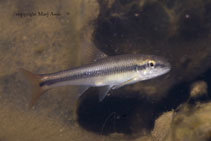Nocomis micropogon (Cope, 1865)
River chubPictures | Google imageNocomis micropogon
Picture by Awai, M.
Classification / Names Common names | Synonyms | Catalog of Fishes(genus, species) | ITIS | CoL | WoRMS | Cloffa
Etymology: Nocomis: An Indian (North America) name used by Charles Girard; ojibwe, nokomiss = grandmother (Ref. 45335); micropogon: From the words micro, meaning tiny; and pogon, beard (referring to the small barbel at the tip of the maxilla) (Ref. 10294).
More on author: Cope.
Environment: milieu / climate zone / depth range / distribution range Ecology
Distribution Territories | FAO areas | Ecosystems | Occurrences | Point map | Introductions | Faunafri
Length at first maturity / Size / Weight / Age
Max length : 33.0 cm TL male/unsexed; (Ref. 10294); common length : 13.5 cm TL male/unsexed; (Ref. 12193); max. reported age: 5 years (Ref. 12193)
Life cycle and mating behavior Maturity | Reproduction | Spawning | Eggs | Fecundity | Larvae
Main reference
Upload your references | References | Coordinator | Collaborators
IUCN Red List Status (Ref. 130435: Version 2025-2)
CITES
Threat to humans
Human uses
More information
Growth parameters
Max. ages / sizes
Length-weight rel.
Length-length rel.
Length-frequencies
Mass conversion
Recruitment
Abundance
Reproduction
Maturity
Maturity/Gills rel.
Fecundity
Spawning
Spawning aggregations
Eggs
Egg development
Larvae
Larval dynamics
Gill area
Brain
Otolith
Body composition
Nutrients
Oxygen consumption
Swimming type
Swimming speed
Visual pigments
Fish sound
Diseases & Parasites
Toxicity (LC50s)
Aquaculture systems
Aquaculture profiles
Strains
Ciguatera cases
Stamps, coins, misc.
Tools
Special reports
Download XML



